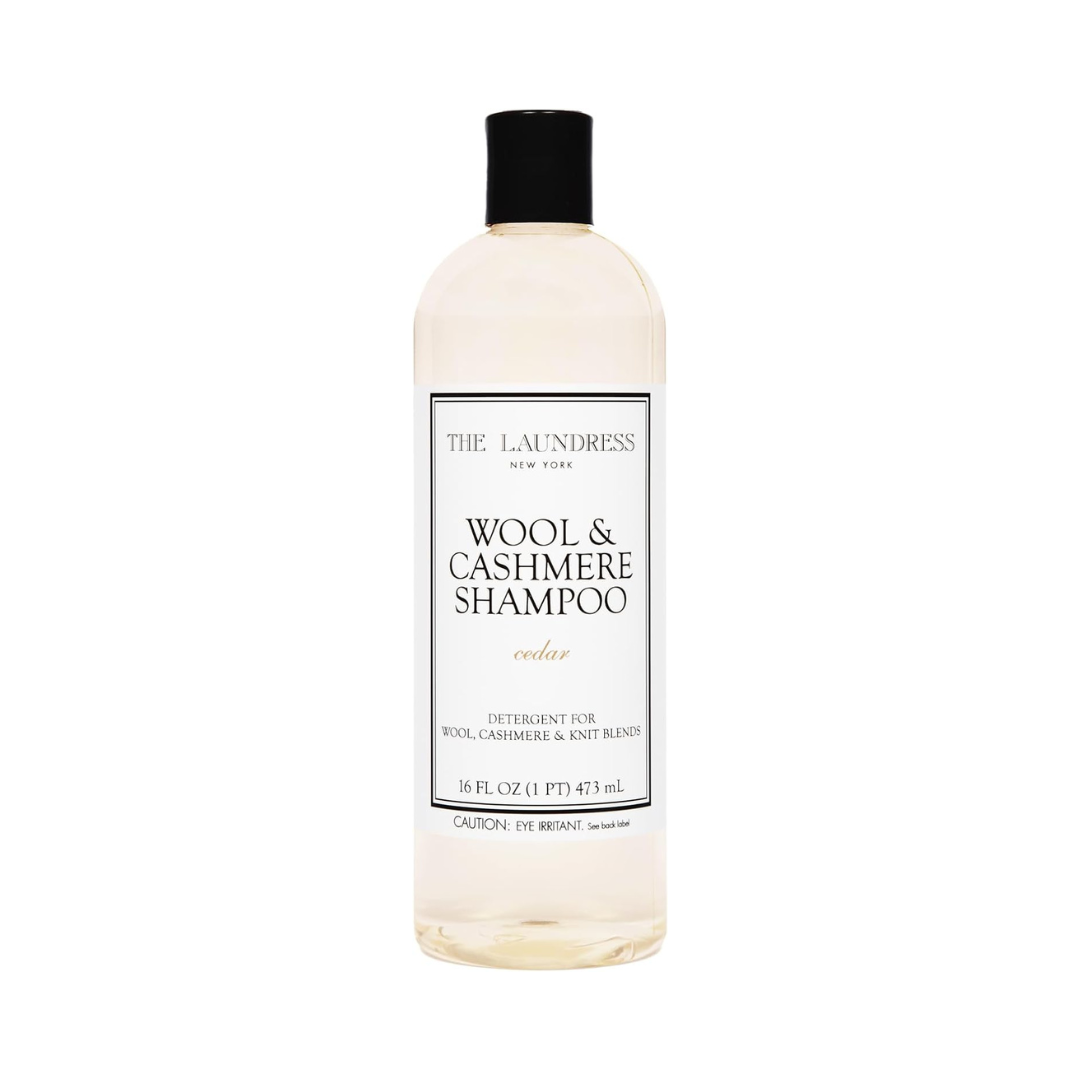
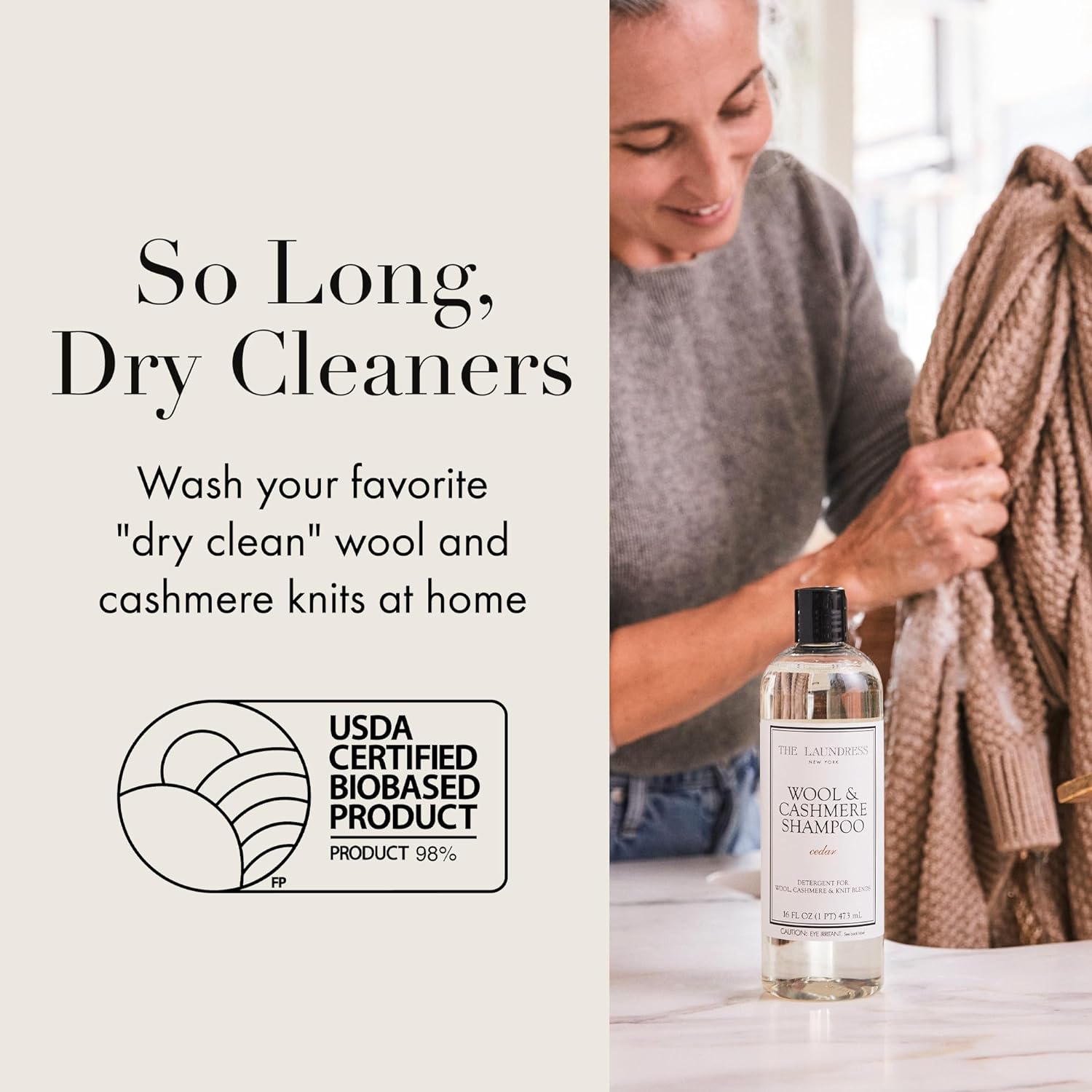
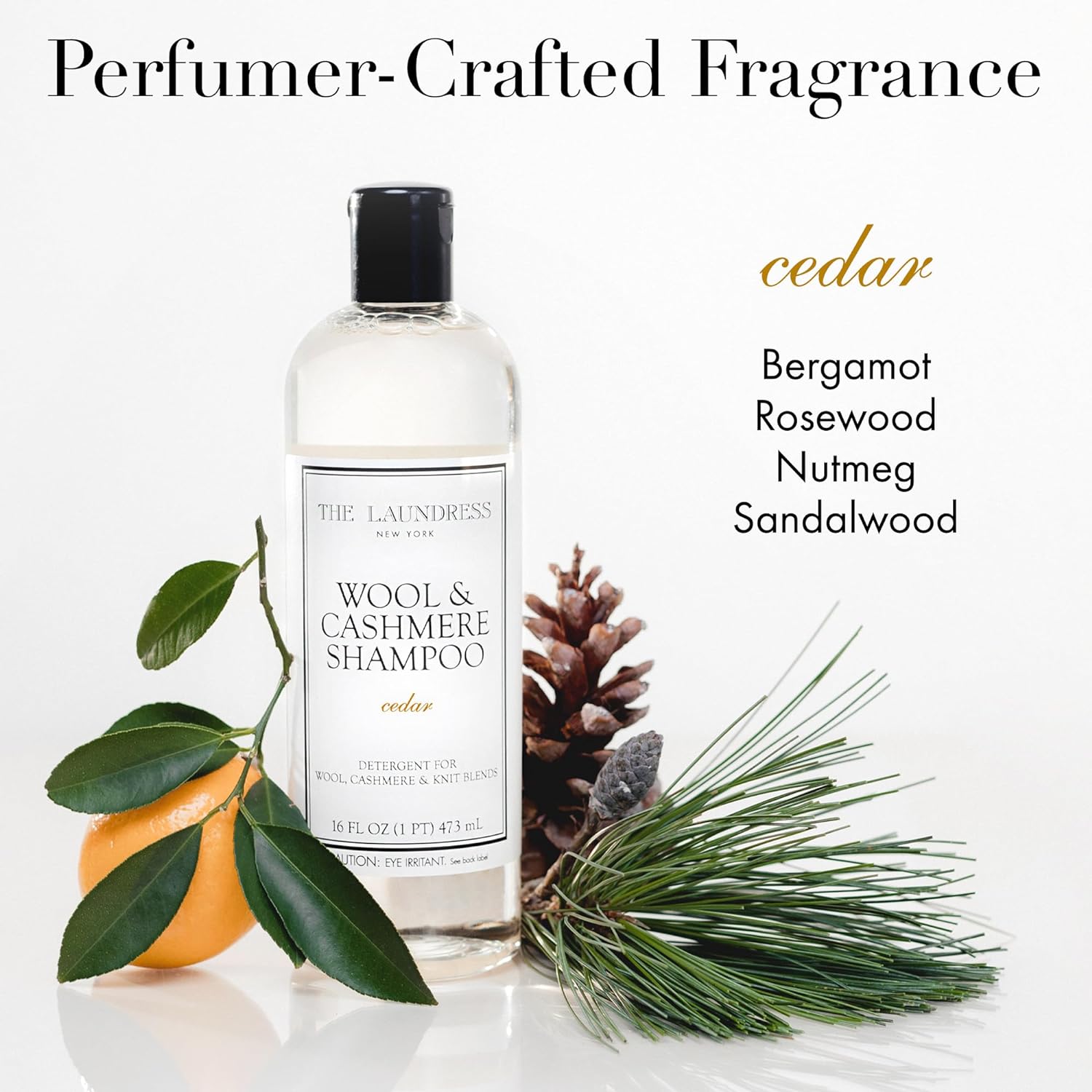
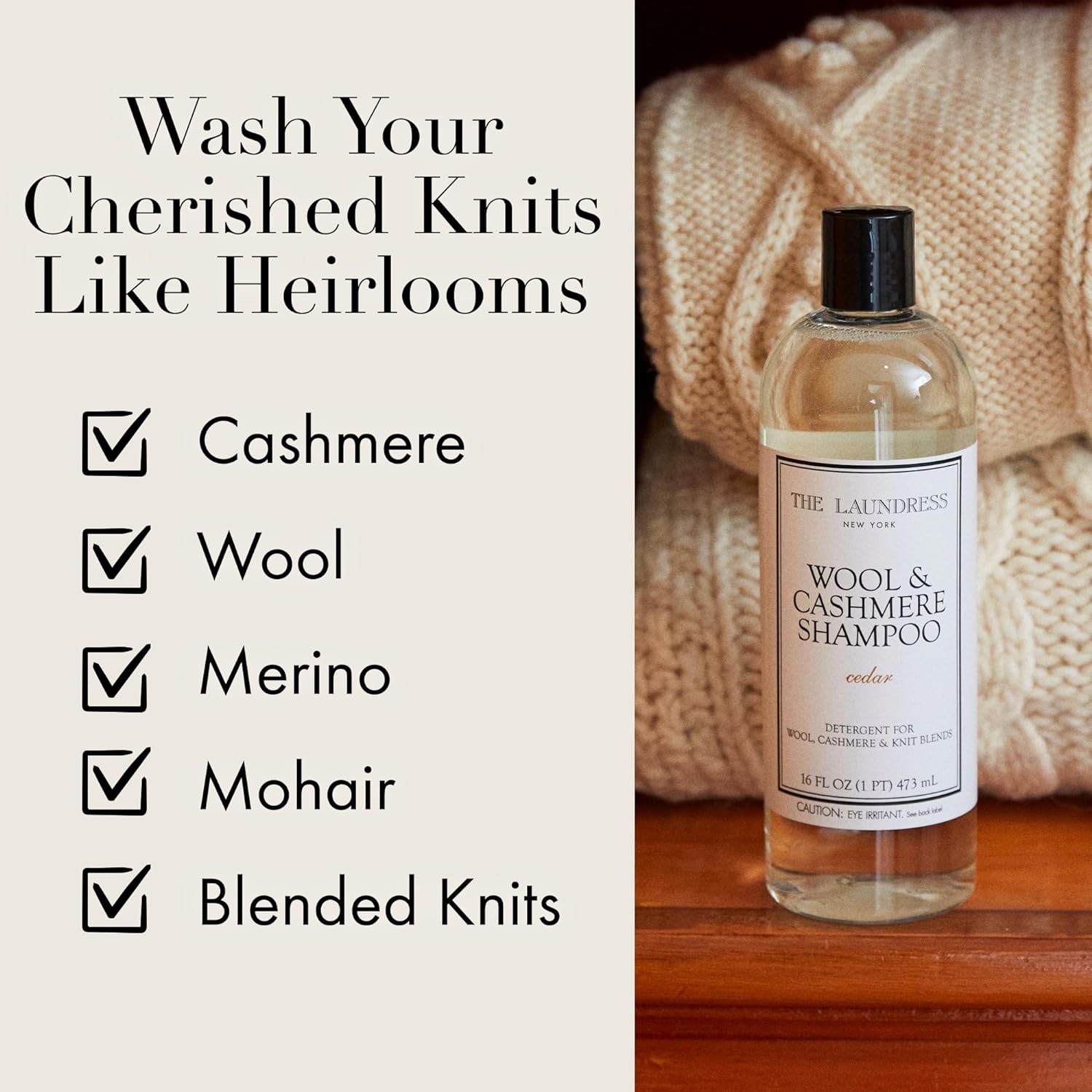
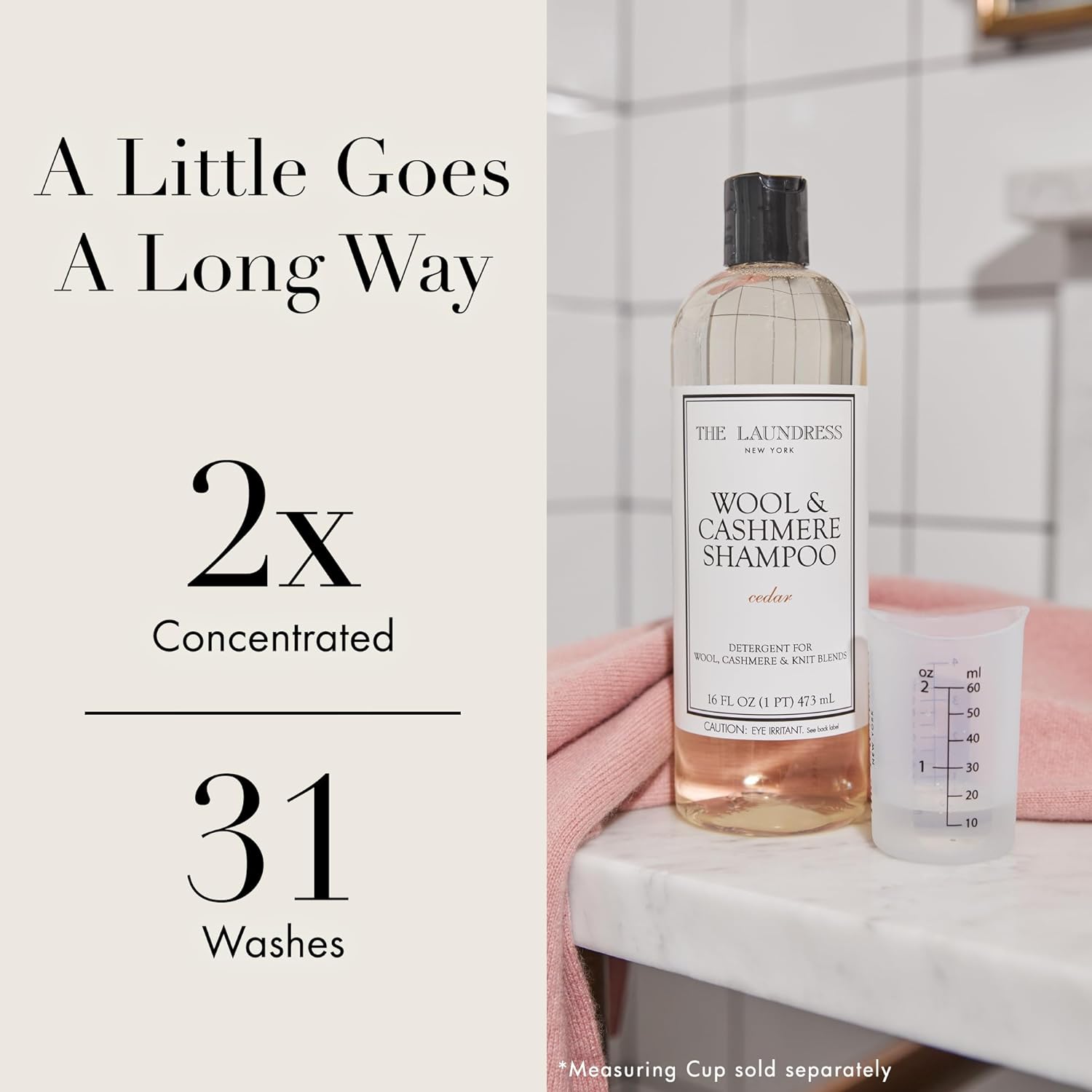
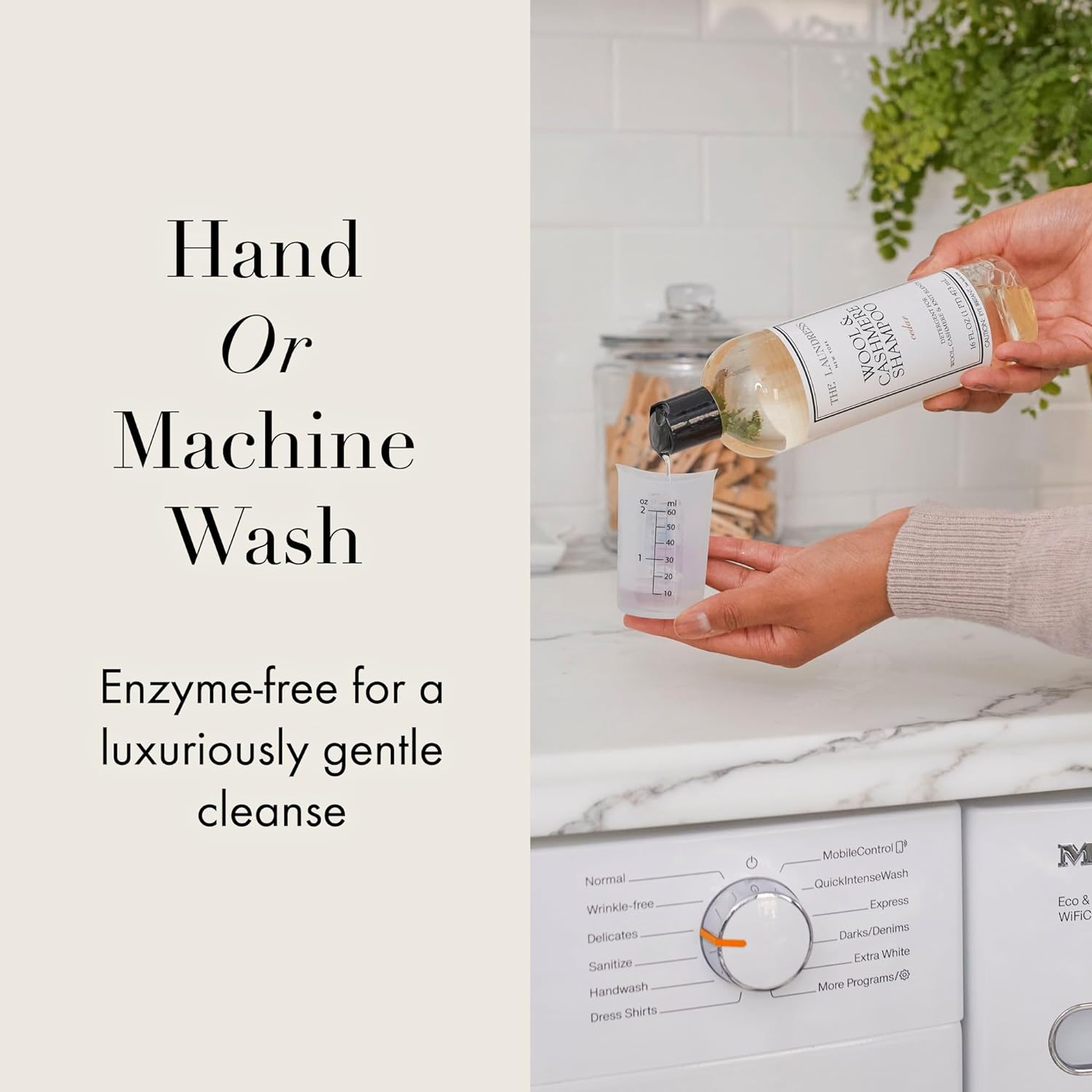


The Laundress Wool & Cashmere Shampoo - Double Concentrated, Cedar Scent, Bio-based - 16 Fl Oz


Benzyl Salicylate
High RiskBenzyl salicylate is an ester of benzyl alcohol and salicylic acid, commonly used in personal care products as a fragrance component and UV filter. It is known for its ability to enhance product stability and provide a pleasant scent.
Sustai Insights
Benzyl salicylate offers functional benefits such as UV protection and fragrance enhancement. However, it is associated with a high allergenic potential and is categorized as a skin irritant, posing significant health risks. Environmental risks include its potential to act as a pollutant. Regulatory authorities have imposed restrictions on its use due to these concerns. Overall, it is assessed as high risk, necessitating caution in usage and consideration of safer alternatives.
Linalool
High RiskLinalool is a terpene commonly found in various plants, particularly in lavender and mint. It is primarily used in products for its fragrance and potential antimicrobial properties. Linalool is also utilized in formulations for its ability to enhance the sensory experience of personal care and household products.
Sustai Insights
Linalool offers functional benefits as a naturally occurring fragrance component and may exhibit antimicrobial properties. However, it presents high allergenic potential, with concerns about skin irritation and sensitization. Environmental risks include contamination issues, though it is not classified as a persistent pollutant. Regulatory bodies have noted the need for careful handling due to its allergenic nature. Overall, despite some beneficial attributes, the ingredient carries a high risk profile, warranting cautious use and consideration of safer alternatives.
Citric Acid
Medium RiskCitric acid is an alpha hydroxy acid used in personal care products primarily for its role as a pH adjuster and natural preservative. It occurs naturally in citrus fruits and is commonly utilized in various formulations for its chelating properties and mild exfoliation benefits.
Sustai Insights
Citric acid offers functional benefits as an effective preservative and pH stabilizer, contributing to product longevity and stability. It is biodegradable and derived from renewable sources. Health risks are low, with minimal concerns regarding carcinogenicity, allergies, and reproductive toxicity. However, moderate use restrictions exist due to potential irritation at high concentrations. Environmental risks are limited, as citric acid is not known to accumulate in ecosystems. Regulatory agencies have no significant advisories against its use. Overall, it is assessed as a medium-risk ingredient, with safe usage practices recommended and alternatives available.
Propylene Glycol
Medium RiskPropylene glycol is a small organic alcohol commonly used in cosmetics and personal care products as a humectant, solvent, and emulsifier. It helps retain moisture, enhances product texture, and aids in the delivery of active ingredients.
Sustai Insights
Propylene glycol serves vital functional benefits, including moisture retention and product stability. It is generally recognized as safe with low concerns for carcinogenicity and developmental toxicity. However, there may be moderate allergenic potential for some individuals. Environmentally, it poses minimal pollution risks and is not bioaccumulative. Regulatory bodies do not impose significant restrictions on its use. Overall, it presents a medium risk due to its allergenic potential and the need for cautious usage in sensitive populations.
D Limonene
Medium RiskD-limonene is a colorless liquid hydrocarbon classified as a terpene. It is primarily derived from citrus fruit peels and is commonly used in fragrances, cleaning products, and as a solvent due to its pleasant scent and ability to dissolve oils.
Sustai Insights
D-limonene serves as an effective solvent and fragrance, with biodegradable properties suggesting some environmental sustainability. However, it poses a high allergenic potential, with possible skin and respiratory irritations. Moderately persistent and bioaccumulative, it raises concerns about environmental impact. Regulatory bodies have noted restrictions on its use due to these risks. Overall, it presents a medium risk level, necessitating safe usage practices and consideration of alternatives like plant-based solvents.
Water
Low RiskWater is a clear, colorless liquid essential for various biological processes. It serves as a solvent in formulations, facilitating the dissolution of other ingredients and enhancing product texture and application. Additionally, water plays a crucial role in hydration and is a key component in many cosmetic and personal care products.
Sustai Insights
Water is an effective solvent and hydrator, contributing to the texture and efficacy of formulations. It is biodegradable and generally regarded as safe, with low concerns regarding carcinogenicity, allergies, and reproductive toxicity. However, excessive water usage can lead to environmental concerns, particularly regarding resource depletion. Regulatory bodies do not impose restrictions on water use in cosmetics. Overall, the risks associated with water are low, making it a safe and essential ingredient.
Vegetarian Glycerin
Low RiskVegetarian glycerin, also known as glycerol, is a colorless, odorless, and viscous liquid derived from plant sources. It is primarily used as a humectant, solvent, and emollient in various personal care products, helping to retain moisture and improve texture.
Sustai Insights
Vegetarian glycerin offers functional benefits as an effective humectant, promoting hydration and skin smoothness. It is biodegradable and typically sustainably sourced. Health risks associated with glycerin are low, with no significant concerns for carcinogenicity, allergens, or reproductive toxicity. Environmental risks are minimal, and it is not subject to major regulatory warnings. Overall, the risk level for this ingredient is low, making it a safe choice in formulations. Safe usage practices include ensuring proper concentrations in products, and alternatives such as propylene glycol exist but may have differing properties.
Sodium Oleate
Low RiskSodium oleate is a sodium salt derived from oleic acid, commonly used as an emulsifier and surfactant in various personal care and cosmetic products. It serves to stabilize formulations and enhance the mixing of oil and water phases, contributing to product texture and consistency.
Sustai Insights
Sodium oleate offers functional benefits as an emulsifier, promoting product stability and improving texture. It is considered low risk concerning health impacts, with minimal concerns regarding carcinogenicity, allergies, or reproductive toxicity. Environmentally, it is not recognized as a significant pollutant or bioaccumulative. Regulatory bodies have not imposed stringent restrictions, indicating its general safety in approved concentrations. While sodium oleate is effective, alternatives such as plant-based emulsifiers may provide similar benefits with potentially enhanced sustainability credentials. Overall, the ingredient poses low risk when used appropriately.
Water
Low RiskWater is a clear, colorless liquid essential for various biological processes. It serves as a solvent in formulations, facilitating the dissolution of other ingredients and enhancing product texture and application. Additionally, water plays a crucial role in hydration and is a key component in many cosmetic and personal care products.
Sustai Insights
Water is an effective solvent and hydrator, contributing to the texture and efficacy of formulations. It is biodegradable and generally regarded as safe, with low concerns regarding carcinogenicity, allergies, and reproductive toxicity. However, excessive water usage can lead to environmental concerns, particularly regarding resource depletion. Regulatory bodies do not impose restrictions on water use in cosmetics. Overall, the risks associated with water are low, making it a safe and essential ingredient.
Benzyl Salicylate
High RiskBenzyl salicylate is an ester of benzyl alcohol and salicylic acid, commonly used in personal care products as a fragrance component and UV filter. It is known for its ability to enhance product stability and provide a pleasant scent.
Sustai Insights
Benzyl salicylate offers functional benefits such as UV protection and fragrance enhancement. However, it is associated with a high allergenic potential and is categorized as a skin irritant, posing significant health risks. Environmental risks include its potential to act as a pollutant. Regulatory authorities have imposed restrictions on its use due to these concerns. Overall, it is assessed as high risk, necessitating caution in usage and consideration of safer alternatives.
Citric Acid
Medium RiskCitric acid is an alpha hydroxy acid used in personal care products primarily for its role as a pH adjuster and natural preservative. It occurs naturally in citrus fruits and is commonly utilized in various formulations for its chelating properties and mild exfoliation benefits.
Sustai Insights
Citric acid offers functional benefits as an effective preservative and pH stabilizer, contributing to product longevity and stability. It is biodegradable and derived from renewable sources. Health risks are low, with minimal concerns regarding carcinogenicity, allergies, and reproductive toxicity. However, moderate use restrictions exist due to potential irritation at high concentrations. Environmental risks are limited, as citric acid is not known to accumulate in ecosystems. Regulatory agencies have no significant advisories against its use. Overall, it is assessed as a medium-risk ingredient, with safe usage practices recommended and alternatives available.
Linalool
High RiskLinalool is a terpene commonly found in various plants, particularly in lavender and mint. It is primarily used in products for its fragrance and potential antimicrobial properties. Linalool is also utilized in formulations for its ability to enhance the sensory experience of personal care and household products.
Sustai Insights
Linalool offers functional benefits as a naturally occurring fragrance component and may exhibit antimicrobial properties. However, it presents high allergenic potential, with concerns about skin irritation and sensitization. Environmental risks include contamination issues, though it is not classified as a persistent pollutant. Regulatory bodies have noted the need for careful handling due to its allergenic nature. Overall, despite some beneficial attributes, the ingredient carries a high risk profile, warranting cautious use and consideration of safer alternatives.
Propylene Glycol
Medium RiskPropylene glycol is a small organic alcohol commonly used in cosmetics and personal care products as a humectant, solvent, and emulsifier. It helps retain moisture, enhances product texture, and aids in the delivery of active ingredients.
Sustai Insights
Propylene glycol serves vital functional benefits, including moisture retention and product stability. It is generally recognized as safe with low concerns for carcinogenicity and developmental toxicity. However, there may be moderate allergenic potential for some individuals. Environmentally, it poses minimal pollution risks and is not bioaccumulative. Regulatory bodies do not impose significant restrictions on its use. Overall, it presents a medium risk due to its allergenic potential and the need for cautious usage in sensitive populations.
Vegetarian Glycerin
Low RiskVegetarian glycerin, also known as glycerol, is a colorless, odorless, and viscous liquid derived from plant sources. It is primarily used as a humectant, solvent, and emollient in various personal care products, helping to retain moisture and improve texture.
Sustai Insights
Vegetarian glycerin offers functional benefits as an effective humectant, promoting hydration and skin smoothness. It is biodegradable and typically sustainably sourced. Health risks associated with glycerin are low, with no significant concerns for carcinogenicity, allergens, or reproductive toxicity. Environmental risks are minimal, and it is not subject to major regulatory warnings. Overall, the risk level for this ingredient is low, making it a safe choice in formulations. Safe usage practices include ensuring proper concentrations in products, and alternatives such as propylene glycol exist but may have differing properties.
Sodium Oleate
Low RiskSodium oleate is a sodium salt derived from oleic acid, commonly used as an emulsifier and surfactant in various personal care and cosmetic products. It serves to stabilize formulations and enhance the mixing of oil and water phases, contributing to product texture and consistency.
Sustai Insights
Sodium oleate offers functional benefits as an emulsifier, promoting product stability and improving texture. It is considered low risk concerning health impacts, with minimal concerns regarding carcinogenicity, allergies, or reproductive toxicity. Environmentally, it is not recognized as a significant pollutant or bioaccumulative. Regulatory bodies have not imposed stringent restrictions, indicating its general safety in approved concentrations. While sodium oleate is effective, alternatives such as plant-based emulsifiers may provide similar benefits with potentially enhanced sustainability credentials. Overall, the ingredient poses low risk when used appropriately.
D Limonene
Medium RiskD-limonene is a colorless liquid hydrocarbon classified as a terpene. It is primarily derived from citrus fruit peels and is commonly used in fragrances, cleaning products, and as a solvent due to its pleasant scent and ability to dissolve oils.
Sustai Insights
D-limonene serves as an effective solvent and fragrance, with biodegradable properties suggesting some environmental sustainability. However, it poses a high allergenic potential, with possible skin and respiratory irritations. Moderately persistent and bioaccumulative, it raises concerns about environmental impact. Regulatory bodies have noted restrictions on its use due to these risks. Overall, it presents a medium risk level, necessitating safe usage practices and consideration of alternatives like plant-based solvents.
Experience the gentle touch of The Laundress Wool & Cashmere Shampoo, specifically designed for your finest fabrics. This double-concentrated, cedar-scented detergent ensures your wool, cashmere, and blends remain beautifully clean without compromising their softness.
- Eco-Friendly Formula: Crafted with bio-based ingredients, this shampoo respects the environment while effectively cleaning.
- Versatile Use: Perfect for hand or machine washing, it accommodates a variety of delicate fabrics including merino and mohair.
- Transparent Dosing: The lightweight consistency allows for mess-free dosing—pair it with The Laundress Laundry Measuring Cup for optimal results (not included).
- Pleasant Scent: Infused with a softer, modern cedar fragrance, it offers a refreshing clean without overwhelming your senses.
- Cost-Effective: With 31 loads per bottle, enjoy long-lasting value while caring for your cherished garments.
Subscribe & Save with Sustai
- Best Price Guarantee: Always enjoy the lowest prices on sustainable home essentials.
- No Surprises: We’ll notify you before shipping. No hidden fees, ever.
- You’re in Charge: Change, pause, or cancel your subscription anytime with ease.
- Eco-Friendly Deliveries: Our grouped shipments mean less packaging and lower emissions.
Join us on a sustainable journey. Special offers for a limited time! Prices and promotions may change.
Recommended Products
Experience the gentle touch of The Laundress Wool & Cashmere Shampoo, specifically designed for your finest fabrics. This double-concentrated, cedar-scented detergent ensures your wool, cashmere, and blends remain beautifully clean without compromising their softness.
- Eco-Friendly Formula: Crafted with bio-based ingredients, this shampoo respects the environment while effectively cleaning.
- Versatile Use: Perfect for hand or machine washing, it accommodates a variety of delicate fabrics including merino and mohair.
- Transparent Dosing: The lightweight consistency allows for mess-free dosing—pair it with The Laundress Laundry Measuring Cup for optimal results (not included).
- Pleasant Scent: Infused with a softer, modern cedar fragrance, it offers a refreshing clean without overwhelming your senses.
- Cost-Effective: With 31 loads per bottle, enjoy long-lasting value while caring for your cherished garments.

You can have at most 2 Sustainable Steals products in your cart
Customer Reviews
Customers’ View
Customers appreciate the gentle yet effective cleaning power of the Wool & Cashmere Shampoo, noting its ability to preserve the softness and quality of delicate fabrics. Many highlight the pleasant cedar scent, describing it as refreshing without being overpowering. Users commend its eco-friendly formulation, which consists of biodegradable ingredients, making it a suitable choice for environmentally conscious consumers. However, some customers express concerns about the product's price relative to the quantity, feeling it may not offer the best value for money, especially for frequent users. Overall, customers find this product effective for maintaining their cherished wool and cashmere items while aligning with their sustainable lifestyle.
AI-generated from the text of customer reviewsThis product has no reviews yet.




